The African Chessboard: Russian Nuclear plays Kingmaker
Welcome to Nicholas Jones writing on Africa: This was first posted at The Canadian Patriot
Energy is Queen
It has long been known that energy is the vital pillar for all nations, for it is the essential source for developing the potential productive powers of that nation and its people. Industry requires a strong energy foundation that can provide the power needed for that potential production and society also needs that very same foundation for a secure and affordable energy supply. Therefore, it would be better to invest in forms of energy that provide the maximum output and longevity for the minimum cost, space, construction time, pollution and other factors. This inevitably leads us to nuclear, for nuclear energy has the best metrics in line with this ratio.
Sure, current nuclear power plants are costly and take a long time to build, but when we consider the average lifespan of a power plant built today is anywhere from 60-100 years (some of the 104 plants in the U.S.A are looking to extend their lifespan to 80 yrs.), the cost is less than its worth in economic reality. While the cost is hard to ignore for developing nations, ranging from $5-10 Billion per plant depending on the amount of reactors; when we consider the energy output over a 24-hour cycle, the longevity and the significantly low waste (soon zero), nuclear is cheaper and safer per kWh than all other energy sources, in both economic and social terms. Not to mention that now with the development of the 4th gen NPP’S, SMR’s (Small Modular reactors) and floating NPP’s, the cost, size, construction time and paperwork, will be reduced significantly.
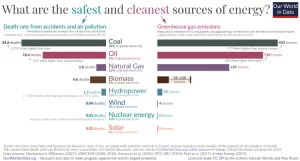
Being the most secure foundation for the development of any nation, we should focus on the nations that have the scientific and industrial capabilities to perform such work and lead the others in their sovereign development in nuclear science.
Russia stands alone on this hill, Promethean flame in hand, the Shepherd in a Nuclear world.
Russia shepherds in a “New-clear” age
A short history on Russia’s scientific prowess is worth revisiting.
Officially starting its nuclear program in 1943 and going on to develop both weapons and commercial energy over a period of 80 years, Russia now dominates in all fields of nuclear energy production, especially in the fuel enrichment process (44% of world production). Abram Alikhanov and Igor Kurchatov are the two giants responsible for the foundation of Russia’s nuclear energy potential that we bear witness to today, having constructed the U.S.S.R’s first reactors together, alongside many other notable names. The F-1 reactor, built by the Kurchatov institute, ignited on 25th December 1946 on Christmas day and what a gift of light it was for the nation; currently possessing 38 Nuclear reactors spread over 10 plants with 29 GW of installed capacity ready at any given moment, providing roughly 223.7 TWh of electricity generation in 2022 which makes up for a rich 19% of the nation’s total generation. The Kurchatov Institute’s President – Mikhail Kovalchuk, announced recently that “Russia possesses nuclear technologies that can be found nowhere else in the world”.

One name that bears responsibility for this almighty industry is Rosatom (Russia’s State Atomic Energy Corporation), the largest provider of energy in Russia. The list is long for Rosatom’s honors and so it follows:
No.1 electricity provider in Russia at 19.66%
No.1 in nuclear plants currently in implementation stage or under construction worldwide (3 in Russia and 33 worldwide, with partners in 50 countries)
17% of Global nuclear fuel market (Russia has 40% of Global Uranium conversion infrastructure and 46% of Global Uranium enrichment capacity since 2018/20)
76% of Global Nuclear Technology exports
World’s largest and only Nuclear Icebreaker fleet (7 in service – 5 planned or under construction)
38% Global Nuclear market share
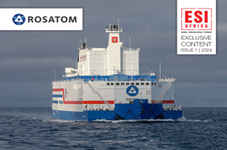
Consists of around 450 enterprises and organizations, accounting for more than 350,000 employees
Participant in ITER and FAIR international science projects
In 2021 Rosatom’s package of foreign orders exceeded $139,9 bln dollars
And so, it is clear who is ready and willing to lead the flock into a nuclear future, a nation with a fully domestic, sovereign technology that will deliver extraordinary projects with absolute precision and punctuality – a hallmark of Russian companies in general.
Russia and Africa: Part of the same Flock
What Russia has to offer a continent like Africa, should now reveal itself for any open mind willing to consider the true potential of such a partnership. We are at a critical junction in world history, one where the economic framework that was largely dominated by the western powers, is now cracking open and leaving space for the Global south to emerge from under that foot, thanks to no other than Russia and China, leading as guarantors of security. Both victims of the colonial/globalist mindset, China, in its century of humiliation (Xi Jinping’s own words) and Russia, standing strong over a 300-year period of constant Napoleonic and Hitlerian designed aggressions aimed at its borders, culminating in the financial destruction done during the 90’s at the behest of those very Globalist powers that sought and seek total capitulation from these great ancient civilization – nation – states.
Simply put, it was not to be, the Crusader’s now face a rejuvenated nation, militarily, economically, culturally and socially. All the while in the southern hemisphere; the long-neglected part of the world the west promised so much to, they bear witness to this transformation of a national economy, capable of an astounding level of organization to not only defeat those forces, but instead be gifted with 3.6% GDP growth for 2023 and 5.1% in Q1 2024. This, after a 1.2% IMF prediction originally in 2023, shows the strength of Russia in all areas and proves the security in nuclear energy as both a strategic and economic pillar of the nation state and economy.
Essentially, Russia shares the reality of a common struggle with Africa against this colonial/globalist political force, one that dates back centuries. What a tragic and yet beautiful coincidence of opposites that now has the potential to bring about a real economic renaissance on the continent. It is Africa who potentially stands to gain most out of the approaching new paradigm, with Ethiopia and Egypt, the newest members of the prestigious BRICS+, now making it 3 African nations out of a total of 9 for that ground-breaking organization. A new dawn has certainly arrived on the continent, Russia broke away from the old flock and Africa wants to know how they pulled it off…
Africa takes up the Nuclear Torch
And so it is, Africa stands on the precipice of an ocean of potential. With long known mineral resources that have largely been the bedrock for the past 400 years of global economic development, revived superpower partners in the form of Russia and China and the youngest population growing at the fastest rate in the world; we surely have realized a ripe moment for the continent. Russia has quietly and yet assuredly sealed bilateral energy agreements with the African nations and it seems that regardless of previous colonial ties or alliances, nothing can stop the tide of nuclear reviving the future of the continent. It is simply too good of a deal to miss out on, and the globalist cabal lacks the previous weight and leverage that was a hallmark of the now side-view mirror, NATO empire. Not entirely out of sight, but BRICS+ has politely overtaken, pulled over and even used indicators.
Russia, the current president of the BRICS+ for 2024 and more specifically, Rosatom, have been busy. Using international forums such as the BRICS+ summit (In Kazan, Russia, October 2024), SPIEF, ATOMEXPO, EEF, SCO, Russia-Africa summit, just to name a few, Rosatom has had the chance to brief leaders in Africa on the vital benefits that nuclear technology has to offer. Let’s look at some of the agreements potentially shaping the continent and the height that some nations have reached, in the dream of realizing a nuclear power plant.
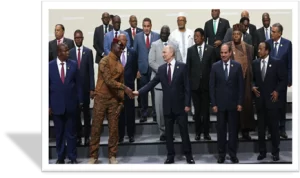
Egypt
MOU signed on nuclear technology transfer
High level intergovernmental engagement
Construction of 4 power units
1.2 GW each – 4.8 GW total plant
KNHP (South Korea) also involved
$28.75 Billion total cost
Start date: July 2022 (All units in construction)
Commission date: 2026 (4 years only)
“NPP project in Dabaa will become the largest joint project between Russia and Egypt since the Aswan dam project; this is, sincerely, a new page in the history of Russian-Egyptian intergovernmental relations. First the NPP will make Egypt a regional technological leader and the region’s only country with NPP 3+ Gen technology“
– Sergey Kiriyenko (Former Head of Rosatom)
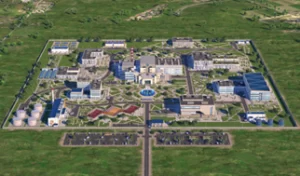
South Africa
Koeberg NPP completed in 1984 by Eskom
Recently announced the preparation to build 2 NPP’s, to be complete in 2032/33
Full nuclear cooperation agreement with Rosatom
Recently announced interest in floating NPP
“South Africa is collaborating with Rosatom on a floating NPP project. (Centre’s of Nuclear Science and Technology (CNST)
The matter of localization is very important.
We will localize production where we can,” – Ryan Collier (Rosatom CEO in Central and Southern Africa)
Republic of Ghana
MOU to build 1.2 GW unit signed in 2015
Infrastructure needed to build it
In 2022, a plan was approved, 5 vendors bid to build 1 GW plant – Rosatom, EDF (France), Nuscale + Regnum (U.S.A), CNNC (China). Decision in December 2024.
Plan is to complete by 2034
Kwame Nkrumah (First President of Ghana) intended to build one in 1960’s but was toppled in a coup while on a visit to China.
“Cabinet will approve the final choice. It can be one vendor or two nations; it will depend on the financial model and the technical details,” – Robert Sogbadji (Spokesman for Energy ministry of Ghana)
Burkina Faso
3x Memorandum of cooperation were signed at SPIEF 2024
Technical specialists to visit to conduct feasibility study
Signed agreement to construct an NPP at ATOMEXPO 2024
This “outlines concrete steps for both sides to build the West African country’s peaceful nuclear workforce, develop nuclear infrastructure and create a positive public opinion regarding nuclear energy in Burkina Faso” – Yacouba Zabre Gouba (Energy minister for Burkina Faso)
“We agreed with the Russian side that a group of technical specialists could arrive in Ouagadougou in the coming days to clarify the details and study what capacity and where this power plant will be located” – Gouba
“Based on the results of the formation of an international legal framework for cooperation, the parties intend to work on the issue of implementing nuclear generation projects and non-energy applications of radiation technologies in agriculture and medicine in Burkina Faso” – Gouba
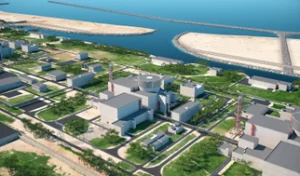
Republic of Guinea
MOU signed at SPIEF 2024
Planned – floating Nuclear Power Plant
“The parties will study the possibility of implementing the floating power units project in the Republic of Guinea with the framework of the agreement reached and will work out the terms and conditions of the project” – Rosatom (El Dabaa NPP – Egypt)
List of African nations in nuclear cooperation agreement
Egypt
Ethiopia
Sudan
Burundi
Nigeria
Zimbabwe
Uganda
Guinea
South Africa
Morocco
Rwanda
DRC
Kenya
Libya
Mali
Namibia
Algeria
Tanzania
Burkina Faso
Zambia
Ghana
These are the 21 African nations currently pursuing a nuclear field with Russian Rosatom and the intensity of interactions is historically unprecedented. China has just witnessed the most profound economic miracle in all human history, lifting 800 million out of poverty in the past 40 years; the question is, with both Nuclear Russia and Infrastructure Dynamo China at the helm, how long will that very same miracle take Africa…
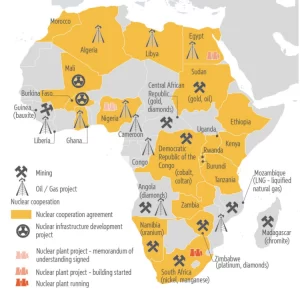
🔹🔹🔹🔹
Author Bio: Nicholas Jones studied at The Royal Ballet School in London for 8 years from age 11-19 before going on to dance as a professional with The Stuttgart Ballet, Ballet du Rhin and Les Grands Ballets Canadiens de Montreal where he currently dances professionally. In 2018, he founded Artists Alliance for Africa dedicated to providing classical arts training for children in Kenya with the goal of establishing a full academy in Kenya.

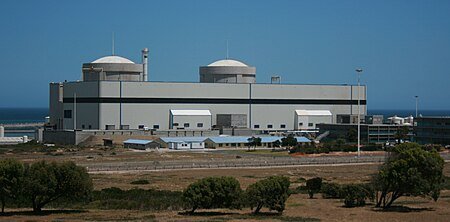
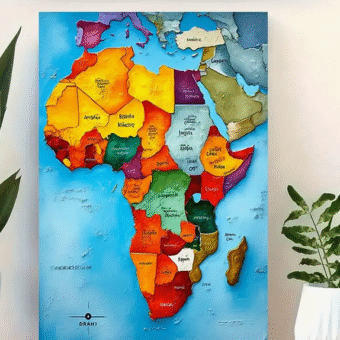







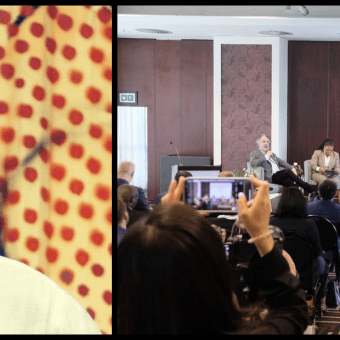

I so appreciated Nick’s research on this issue. One wants to know, but there are not enough hours in the day. Thanks Nick! Hehe .. its funny – the man that I was married to once upon a time was part of the initial Koeberg Nuclear Power station staff. So,… Read more »
“Africa stands on the precipice of an ocean of potential.”
I couldn’t agree more! Thank you so much for the important information. Energy is key.